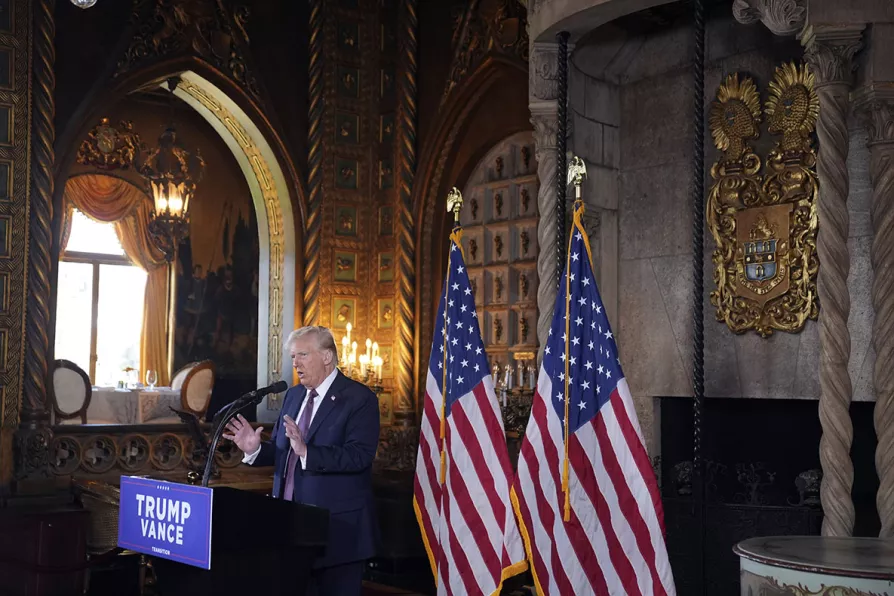
 President-elect Donald Trump speaks during a news conference at Mar-a-Lago, January 7, 2025, in Palm Beach, Fla.
President-elect Donald Trump speaks during a news conference at Mar-a-Lago, January 7, 2025, in Palm Beach, Fla.
DONALD TRUMP’S return to the White House is prompting a realignment towards the hard right across the Establishment.
Far more than during his first term. Then many liberals assumed a Trump presidency could be weathered until US politics got back to normal.
Those prepared to ignore actual vote shares were able to imagine that wins like Emmanuel Macron’s ascendancy to the French presidency showed liberalism was still in the game. Now, while the senile old man soon to leave the White House seems a fitting representative of a dying world order, younger leaders from Macron to Olaf Scholz look likewise exhausted.
More important still, the left was a serious player during the first Trump presidency. Liberals hated it — Tony Blair spoke for many when he despaired of the choice between Boris Johnson and Jeremy Corbyn, dreaming that a centrist option would rout either (Change UK, anyone?) But to have embraced Trumpism when a mass socialist party looked capable of winning office would have risked what Establishment forces dread most — a division of politics along class lines.
Across most of the West the left no longer looks like a challenger for power. The right is ascendant and the powerful are coalescing around it.
Mark Zuckerberg replacing Nick Clegg, electoral-disaster liberalism personified, with US Republican Joel Kaplan as head of global affairs for Meta (which owns Facebook) is one signal, as is Facebook’s announcement that it will drop fact-checking and prioritise free speech.
In Britain we should not obsess over that. Meta’s regulation of online content was never mainly directed at the right — as exposed by Human Rights Watch, it involves “systemic online censorship… silencing voices in support of Palestine.” Anyway the policy change applies to the United States and Meta says it has no plans to apply it here. But it should put paid to the idea of “good” and “bad” tech tycoons. Tech tycoons are a problem, full stop.
Reactions to Trump from US allies are also noteworthy. He has heaped humiliation on Canada’s Justin Trudeau, who has been forced to resign over how to respond even before Trump enters office. Denmark’s PM Mette Frederiksen pathetically pleads that the US is “our closest ally” while Trump talks casually of annexing its territory.
Even if Trump isn’t serious, these threats indicate a changed relationship. Some speculate they are a pointed reminder that Washington’s allies are not partners but vassals, and in an era of challenges to US power it is no longer prepared to pretend otherwise.
This will have domestic political ramifications. It looks bad. Faced with a possible trade war, divisions in the British government could end Starmer’s career as they have Trudeau’s.
This is all very grim, but the left should sense opportunity too. Trump is unpopular in Britain, and Establishment desperation to cosy up to him weakens liberal claims to be a bulwark against the far right.
Nothing did more damage to the Corbyn movement than the diversion of the left into defence of the status quo, supposedly to stop right-wing populism (“Trump — Brexit — Sound the Alarm!”) Large sections of Corbyn’s support fell behind liberal leadership, dividing Labour from majority working-class sentiment and diluting the insurgent politics that fuelled the “Corbyn surge” of 2015-17.
Now, it is clear that only the socialist left will resist Trump: here is the potential to rebuild, and to do so on an anti-imperialist basis tying resistance to the far right to opposing a bullying United States and membership of its war alliance, Nato.
The starting point is unity around the most pressing cause on Earth: ending the genocide in Palestine.
The incoming US president openly backs the erasure of the Palestinians by Israel, and the British government will follow him. Here is the basis for a mass resistance that draws in all anti-racist forces in opposition to imperialism and war.














